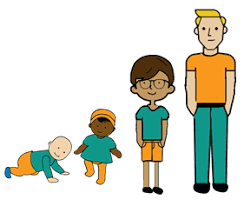
Unlocking the Potential: Nurturing Your Child’s Development
The Importance of Child Development
Child development is a fascinating and crucial process that shapes the future of every individual. From the moment a child is born, they embark on a journey of growth and learning that continues throughout their lives.
During the early years, children develop at a rapid pace, acquiring new skills and abilities that form the foundation for their future success. It is during this time that crucial milestones such as walking, talking, and social interaction are achieved.
Physical development plays a significant role in a child’s overall well-being. Through activities such as crawling, walking, and running, children build strength, coordination, and motor skills. These physical abilities not only enable them to explore the world around them but also contribute to their cognitive development.
Cognitive development involves the growth of thinking skills, problem-solving abilities, and intellectual capacity. As children engage in play, exploration, and education, they develop critical thinking skills that lay the groundwork for academic success later in life.
Social and emotional development are equally important aspects of a child’s growth. Through interactions with family members, peers, and caregivers, children learn how to communicate effectively, manage their emotions, and build relationships. These skills are essential for navigating social situations and forming healthy connections with others.
It is crucial for parents, educators, and caregivers to support and nurture every aspect of a child’s development. By providing a stimulating environment, offering opportunities for exploration and learning, and fostering positive relationships, adults can help children reach their full potential.
Every child is unique, with their own strengths, challenges, and interests. By recognising and celebrating these individual differences, we can create an inclusive environment where all children can thrive.
Child development is an ongoing process that requires patience, understanding, and encouragement. By investing in the growth and well-being of our children today, we are shaping the leaders of tomorrow.
Five Key Benefits of Child Development: Boosting Cognitive, Physical, and Emotional Growth
- Enhances cognitive abilities and problem-solving skills.
- Promotes physical health and motor skill development.
- Fosters social skills and emotional intelligence.
- Encourages creativity, imagination, and self-expression.
- Builds resilience, confidence, and independence.
Challenges Affecting Child Development: Key Factors Impeding Growth and Progress
- Developmental delays can occur, impacting a child’s ability to reach milestones at the expected time.
- Environmental factors such as poverty or neglect can hinder optimal development.
- Some children may face learning difficulties or disabilities that affect their progress.
- Inconsistent or inadequate support from caregivers can impede a child’s development.
- Excessive screen time and lack of physical activity can negatively impact a child’s overall growth.
- Social challenges such as bullying or isolation can hinder emotional and social development.
Enhances cognitive abilities and problem-solving skills.
Enhancing cognitive abilities and problem-solving skills is a significant benefit of child development. As children engage in various activities, such as puzzles, games, and educational tasks, they are challenged to think critically, analyse information, and come up with creative solutions. This process not only strengthens their mental capacity but also equips them with essential skills that are vital for academic success and future endeavours. By fostering cognitive development in children, we are empowering them to navigate challenges confidently and approach problems with a strategic mindset.
Promotes physical health and motor skill development.
Promoting physical health and motor skill development is a crucial benefit of child development. Engaging in physical activities such as running, jumping, and playing not only strengthens a child’s muscles and bones but also enhances their coordination and balance. By encouraging children to be active, we support their overall well-being and lay the foundation for a healthy lifestyle. Developing motor skills through play and movement not only helps children navigate their environment with confidence but also fosters a sense of independence and accomplishment. Prioritising physical health in early childhood sets the stage for a lifetime of good habits and ensures that children grow up strong, agile, and ready to take on new challenges.
Fosters social skills and emotional intelligence.
One of the key benefits of child development is that it fosters social skills and emotional intelligence. Through interactions with peers, family members, and caregivers, children learn how to communicate effectively, express their emotions, and navigate complex social situations. By developing these crucial skills from a young age, children are better equipped to form meaningful relationships, empathise with others, and collaborate effectively in various settings. Building strong social skills and emotional intelligence not only enhances a child’s personal growth but also sets a solid foundation for their future success in both personal and professional realms.
Encourages creativity, imagination, and self-expression.
Encouraging creativity, imagination, and self-expression in children is a vital aspect of their development. Through creative activities such as art, music, storytelling, and imaginative play, children are able to explore their unique perspectives, ideas, and emotions. This not only fosters a sense of individuality but also enhances problem-solving skills, critical thinking abilities, and emotional intelligence. By nurturing creativity and imagination in children, we empower them to express themselves authentically and to approach challenges with innovation and confidence.
Builds resilience, confidence, and independence.
Building resilience, confidence, and independence is a key pro of child development. As children navigate challenges, setbacks, and new experiences, they learn to adapt, persevere, and believe in their abilities. By overcoming obstacles and taking on tasks independently, children gain confidence in their skills and develop a sense of self-reliance. This process not only equips them with the tools to face future challenges but also fosters a strong sense of resilience that will serve them well throughout their lives.
Developmental delays can occur, impacting a child’s ability to reach milestones at the expected time.
Developmental delays can present a significant challenge in a child’s development, affecting their ability to achieve important milestones within the typical timeframe. When a child experiences delays in areas such as language, motor skills, or social interaction, it can impact their overall growth and progress. Early identification and intervention are crucial in addressing these delays and providing the necessary support to help children overcome obstacles and reach their full potential. By recognising and addressing developmental delays promptly, caregivers and professionals can create tailored strategies to promote the child’s development and ensure they receive the assistance they need to thrive.
Environmental factors such as poverty or neglect can hinder optimal development.
Environmental factors, such as poverty or neglect, can have a significant impact on a child’s development. Growing up in an environment where resources are scarce, basic needs are unmet, or emotional support is lacking can hinder a child’s ability to thrive and reach their full potential. Children facing these challenges may experience developmental delays, struggle academically, and have difficulty forming healthy relationships. It is crucial for society to address these environmental factors and provide support systems to ensure that every child has the opportunity to grow and develop in a nurturing and enriching environment.
Some children may face learning difficulties or disabilities that affect their progress.
Some children may encounter learning difficulties or disabilities that impact their developmental journey. These challenges can present obstacles to their progress in acquiring new skills and reaching important milestones. It is essential for parents, educators, and healthcare professionals to provide tailored support and interventions to help these children overcome their difficulties and thrive. By offering individualised strategies, resources, and a supportive environment, we can empower children facing learning obstacles to reach their full potential and lead fulfilling lives.
Inconsistent or inadequate support from caregivers can impede a child’s development.
Inconsistent or inadequate support from caregivers can have a detrimental impact on a child’s development. Children rely on consistent care, love, and guidance from their caregivers to thrive and reach their full potential. When support is lacking or unpredictable, children may struggle to form secure attachments, develop trust, and regulate their emotions effectively. This can lead to difficulties in social interactions, cognitive growth, and overall well-being. Caregivers play a crucial role in providing a stable and nurturing environment that fosters healthy development in children, and when this support is inconsistent or inadequate, it can impede a child’s progress and hinder their ability to flourish.
Excessive screen time and lack of physical activity can negatively impact a child’s overall growth.
Excessive screen time and lack of physical activity can have detrimental effects on a child’s development. Spending too much time in front of screens can lead to decreased social interaction, limited physical movement, and potential issues with attention and concentration. Without sufficient opportunities for physical activity, children may miss out on crucial experiences that promote motor skills development, overall health, and emotional well-being. It is essential for parents and caregivers to monitor and limit screen time while encouraging children to engage in active play and outdoor activities to support their holistic growth and development.
Social challenges such as bullying or isolation can hinder emotional and social development.
Social challenges, such as bullying or isolation, can have a significant impact on a child’s emotional and social development. When children experience bullying, they may struggle with low self-esteem, anxiety, and a fear of social interactions. This can hinder their ability to form positive relationships and trust others, ultimately affecting their emotional well-being. Similarly, isolation can lead to feelings of loneliness, sadness, and a lack of social skills. Without opportunities for meaningful social connections, children may find it challenging to develop empathy, communication skills, and the ability to navigate complex social situations. Addressing these social challenges is crucial in supporting children’s emotional and social development and creating a safe and inclusive environment for all.



